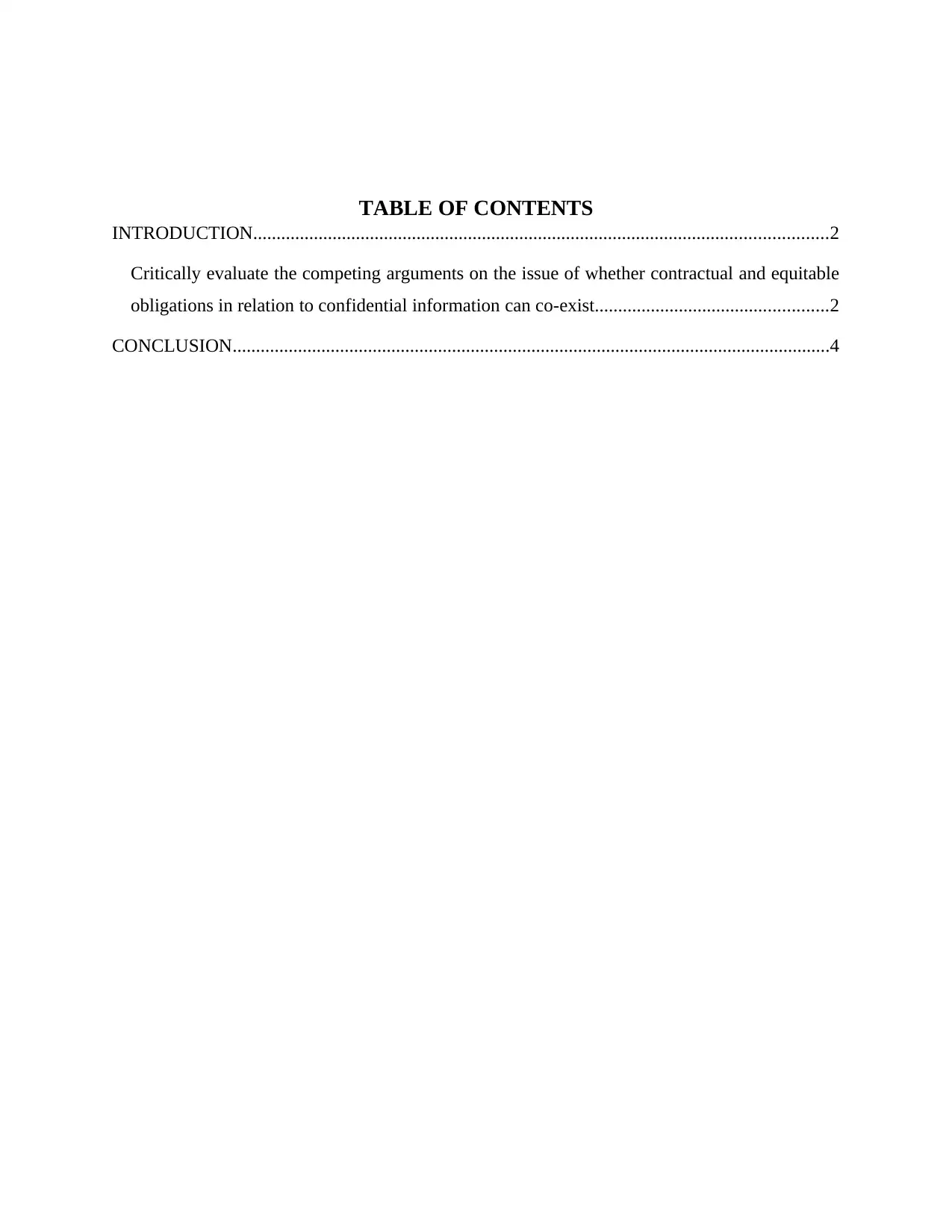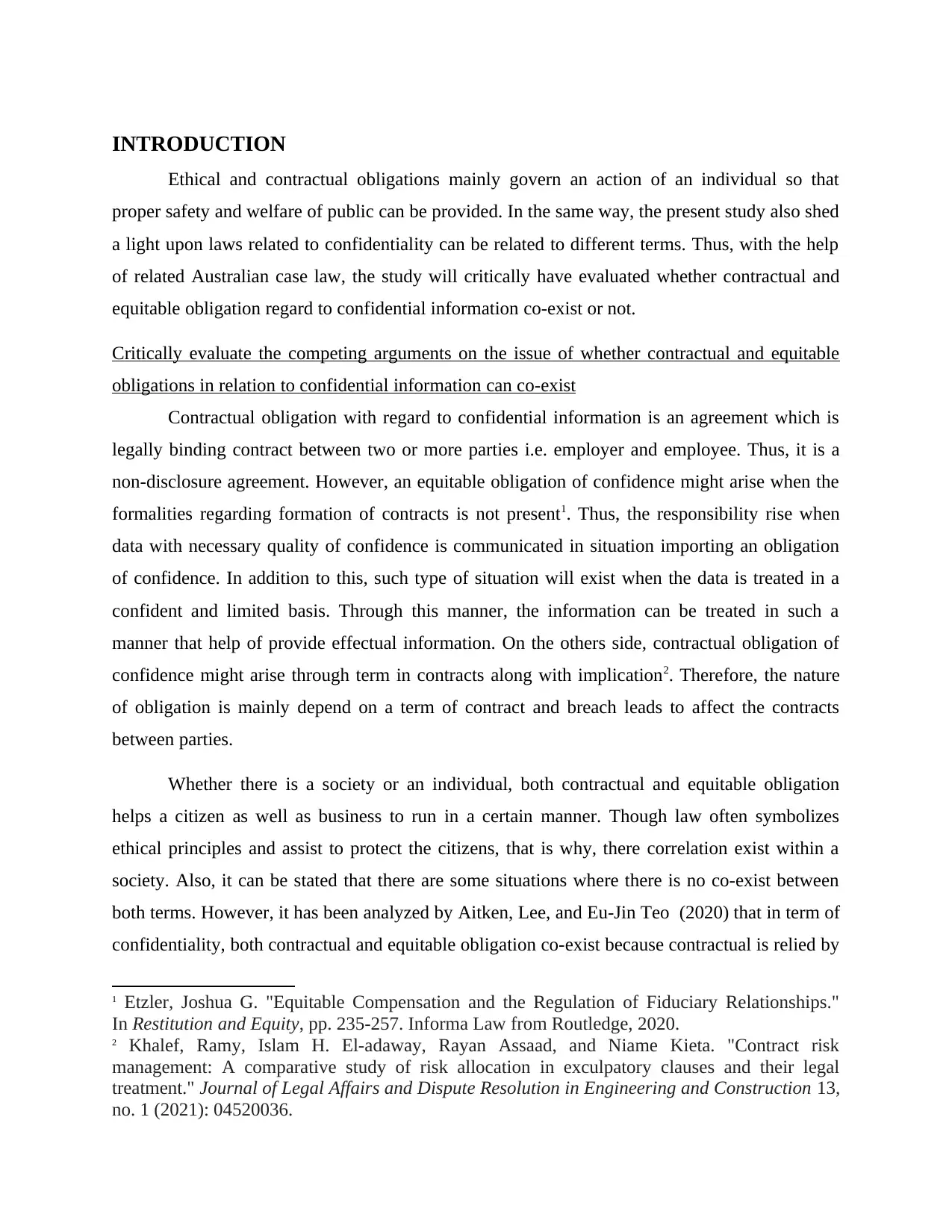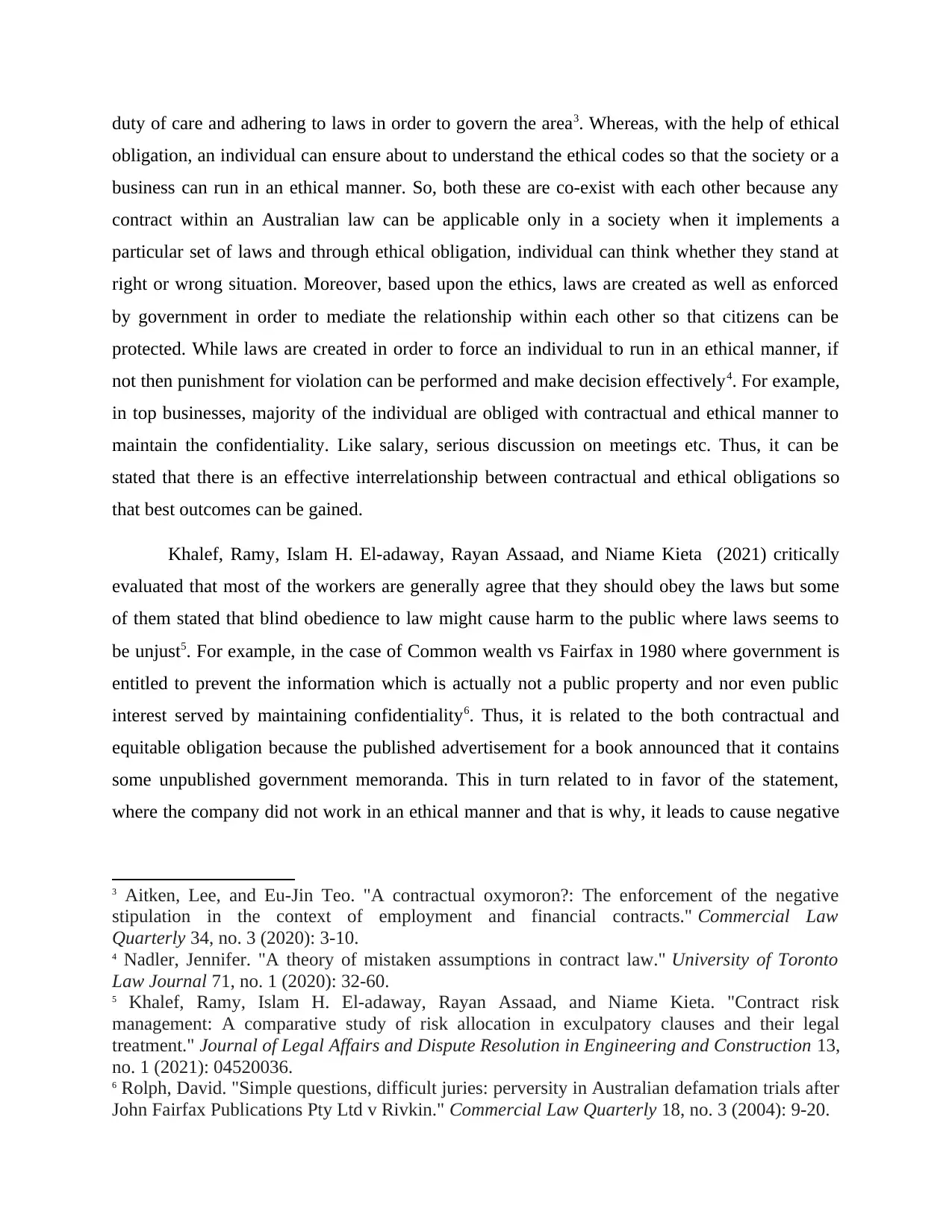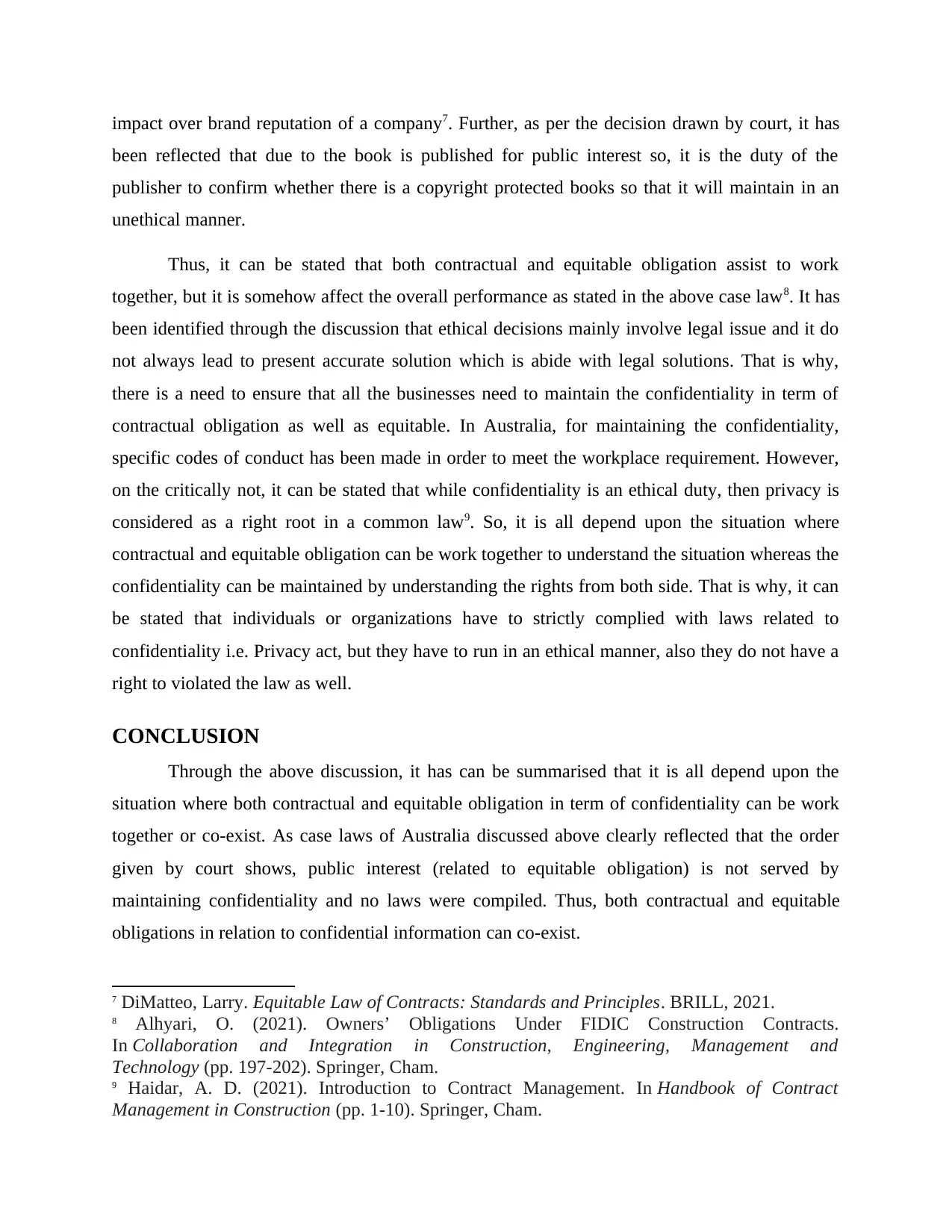Contractual and Equitable Obligations in Relation to Confidential Information
VerifiedAdded on 2023/06/15
|6
|1510
|302
AI Summary
This study critically evaluates whether contractual and equitable obligations in relation to confidential information can co-exist. It sheds light on related Australian case law and discusses the interrelationship between contractual and ethical obligations. The study concludes that both contractual and equitable obligations can co-exist in certain situations.
Contribute Materials
Your contribution can guide someone’s learning journey. Share your
documents today.

Equity
Secure Best Marks with AI Grader
Need help grading? Try our AI Grader for instant feedback on your assignments.

TABLE OF CONTENTS
INTRODUCTION...........................................................................................................................2
Critically evaluate the competing arguments on the issue of whether contractual and equitable
obligations in relation to confidential information can co-exist..................................................2
CONCLUSION................................................................................................................................4
INTRODUCTION...........................................................................................................................2
Critically evaluate the competing arguments on the issue of whether contractual and equitable
obligations in relation to confidential information can co-exist..................................................2
CONCLUSION................................................................................................................................4

INTRODUCTION
Ethical and contractual obligations mainly govern an action of an individual so that
proper safety and welfare of public can be provided. In the same way, the present study also shed
a light upon laws related to confidentiality can be related to different terms. Thus, with the help
of related Australian case law, the study will critically have evaluated whether contractual and
equitable obligation regard to confidential information co-exist or not.
Critically evaluate the competing arguments on the issue of whether contractual and equitable
obligations in relation to confidential information can co-exist
Contractual obligation with regard to confidential information is an agreement which is
legally binding contract between two or more parties i.e. employer and employee. Thus, it is a
non-disclosure agreement. However, an equitable obligation of confidence might arise when the
formalities regarding formation of contracts is not present1. Thus, the responsibility rise when
data with necessary quality of confidence is communicated in situation importing an obligation
of confidence. In addition to this, such type of situation will exist when the data is treated in a
confident and limited basis. Through this manner, the information can be treated in such a
manner that help of provide effectual information. On the others side, contractual obligation of
confidence might arise through term in contracts along with implication2. Therefore, the nature
of obligation is mainly depend on a term of contract and breach leads to affect the contracts
between parties.
Whether there is a society or an individual, both contractual and equitable obligation
helps a citizen as well as business to run in a certain manner. Though law often symbolizes
ethical principles and assist to protect the citizens, that is why, there correlation exist within a
society. Also, it can be stated that there are some situations where there is no co-exist between
both terms. However, it has been analyzed by Aitken, Lee, and Eu-Jin Teo (2020) that in term of
confidentiality, both contractual and equitable obligation co-exist because contractual is relied by
1 Etzler, Joshua G. "Equitable Compensation and the Regulation of Fiduciary Relationships."
In Restitution and Equity, pp. 235-257. Informa Law from Routledge, 2020.
2 Khalef, Ramy, Islam H. El-adaway, Rayan Assaad, and Niame Kieta. "Contract risk
management: A comparative study of risk allocation in exculpatory clauses and their legal
treatment." Journal of Legal Affairs and Dispute Resolution in Engineering and Construction 13,
no. 1 (2021): 04520036.
Ethical and contractual obligations mainly govern an action of an individual so that
proper safety and welfare of public can be provided. In the same way, the present study also shed
a light upon laws related to confidentiality can be related to different terms. Thus, with the help
of related Australian case law, the study will critically have evaluated whether contractual and
equitable obligation regard to confidential information co-exist or not.
Critically evaluate the competing arguments on the issue of whether contractual and equitable
obligations in relation to confidential information can co-exist
Contractual obligation with regard to confidential information is an agreement which is
legally binding contract between two or more parties i.e. employer and employee. Thus, it is a
non-disclosure agreement. However, an equitable obligation of confidence might arise when the
formalities regarding formation of contracts is not present1. Thus, the responsibility rise when
data with necessary quality of confidence is communicated in situation importing an obligation
of confidence. In addition to this, such type of situation will exist when the data is treated in a
confident and limited basis. Through this manner, the information can be treated in such a
manner that help of provide effectual information. On the others side, contractual obligation of
confidence might arise through term in contracts along with implication2. Therefore, the nature
of obligation is mainly depend on a term of contract and breach leads to affect the contracts
between parties.
Whether there is a society or an individual, both contractual and equitable obligation
helps a citizen as well as business to run in a certain manner. Though law often symbolizes
ethical principles and assist to protect the citizens, that is why, there correlation exist within a
society. Also, it can be stated that there are some situations where there is no co-exist between
both terms. However, it has been analyzed by Aitken, Lee, and Eu-Jin Teo (2020) that in term of
confidentiality, both contractual and equitable obligation co-exist because contractual is relied by
1 Etzler, Joshua G. "Equitable Compensation and the Regulation of Fiduciary Relationships."
In Restitution and Equity, pp. 235-257. Informa Law from Routledge, 2020.
2 Khalef, Ramy, Islam H. El-adaway, Rayan Assaad, and Niame Kieta. "Contract risk
management: A comparative study of risk allocation in exculpatory clauses and their legal
treatment." Journal of Legal Affairs and Dispute Resolution in Engineering and Construction 13,
no. 1 (2021): 04520036.

duty of care and adhering to laws in order to govern the area3. Whereas, with the help of ethical
obligation, an individual can ensure about to understand the ethical codes so that the society or a
business can run in an ethical manner. So, both these are co-exist with each other because any
contract within an Australian law can be applicable only in a society when it implements a
particular set of laws and through ethical obligation, individual can think whether they stand at
right or wrong situation. Moreover, based upon the ethics, laws are created as well as enforced
by government in order to mediate the relationship within each other so that citizens can be
protected. While laws are created in order to force an individual to run in an ethical manner, if
not then punishment for violation can be performed and make decision effectively4. For example,
in top businesses, majority of the individual are obliged with contractual and ethical manner to
maintain the confidentiality. Like salary, serious discussion on meetings etc. Thus, it can be
stated that there is an effective interrelationship between contractual and ethical obligations so
that best outcomes can be gained.
Khalef, Ramy, Islam H. El-adaway, Rayan Assaad, and Niame Kieta (2021) critically
evaluated that most of the workers are generally agree that they should obey the laws but some
of them stated that blind obedience to law might cause harm to the public where laws seems to
be unjust5. For example, in the case of Common wealth vs Fairfax in 1980 where government is
entitled to prevent the information which is actually not a public property and nor even public
interest served by maintaining confidentiality6. Thus, it is related to the both contractual and
equitable obligation because the published advertisement for a book announced that it contains
some unpublished government memoranda. This in turn related to in favor of the statement,
where the company did not work in an ethical manner and that is why, it leads to cause negative
3 Aitken, Lee, and Eu-Jin Teo. "A contractual oxymoron?: The enforcement of the negative
stipulation in the context of employment and financial contracts." Commercial Law
Quarterly 34, no. 3 (2020): 3-10.
4 Nadler, Jennifer. "A theory of mistaken assumptions in contract law." University of Toronto
Law Journal 71, no. 1 (2020): 32-60.
5 Khalef, Ramy, Islam H. El-adaway, Rayan Assaad, and Niame Kieta. "Contract risk
management: A comparative study of risk allocation in exculpatory clauses and their legal
treatment." Journal of Legal Affairs and Dispute Resolution in Engineering and Construction 13,
no. 1 (2021): 04520036.
6 Rolph, David. "Simple questions, difficult juries: perversity in Australian defamation trials after
John Fairfax Publications Pty Ltd v Rivkin." Commercial Law Quarterly 18, no. 3 (2004): 9-20.
obligation, an individual can ensure about to understand the ethical codes so that the society or a
business can run in an ethical manner. So, both these are co-exist with each other because any
contract within an Australian law can be applicable only in a society when it implements a
particular set of laws and through ethical obligation, individual can think whether they stand at
right or wrong situation. Moreover, based upon the ethics, laws are created as well as enforced
by government in order to mediate the relationship within each other so that citizens can be
protected. While laws are created in order to force an individual to run in an ethical manner, if
not then punishment for violation can be performed and make decision effectively4. For example,
in top businesses, majority of the individual are obliged with contractual and ethical manner to
maintain the confidentiality. Like salary, serious discussion on meetings etc. Thus, it can be
stated that there is an effective interrelationship between contractual and ethical obligations so
that best outcomes can be gained.
Khalef, Ramy, Islam H. El-adaway, Rayan Assaad, and Niame Kieta (2021) critically
evaluated that most of the workers are generally agree that they should obey the laws but some
of them stated that blind obedience to law might cause harm to the public where laws seems to
be unjust5. For example, in the case of Common wealth vs Fairfax in 1980 where government is
entitled to prevent the information which is actually not a public property and nor even public
interest served by maintaining confidentiality6. Thus, it is related to the both contractual and
equitable obligation because the published advertisement for a book announced that it contains
some unpublished government memoranda. This in turn related to in favor of the statement,
where the company did not work in an ethical manner and that is why, it leads to cause negative
3 Aitken, Lee, and Eu-Jin Teo. "A contractual oxymoron?: The enforcement of the negative
stipulation in the context of employment and financial contracts." Commercial Law
Quarterly 34, no. 3 (2020): 3-10.
4 Nadler, Jennifer. "A theory of mistaken assumptions in contract law." University of Toronto
Law Journal 71, no. 1 (2020): 32-60.
5 Khalef, Ramy, Islam H. El-adaway, Rayan Assaad, and Niame Kieta. "Contract risk
management: A comparative study of risk allocation in exculpatory clauses and their legal
treatment." Journal of Legal Affairs and Dispute Resolution in Engineering and Construction 13,
no. 1 (2021): 04520036.
6 Rolph, David. "Simple questions, difficult juries: perversity in Australian defamation trials after
John Fairfax Publications Pty Ltd v Rivkin." Commercial Law Quarterly 18, no. 3 (2004): 9-20.
Secure Best Marks with AI Grader
Need help grading? Try our AI Grader for instant feedback on your assignments.

impact over brand reputation of a company7. Further, as per the decision drawn by court, it has
been reflected that due to the book is published for public interest so, it is the duty of the
publisher to confirm whether there is a copyright protected books so that it will maintain in an
unethical manner.
Thus, it can be stated that both contractual and equitable obligation assist to work
together, but it is somehow affect the overall performance as stated in the above case law8. It has
been identified through the discussion that ethical decisions mainly involve legal issue and it do
not always lead to present accurate solution which is abide with legal solutions. That is why,
there is a need to ensure that all the businesses need to maintain the confidentiality in term of
contractual obligation as well as equitable. In Australia, for maintaining the confidentiality,
specific codes of conduct has been made in order to meet the workplace requirement. However,
on the critically not, it can be stated that while confidentiality is an ethical duty, then privacy is
considered as a right root in a common law9. So, it is all depend upon the situation where
contractual and equitable obligation can be work together to understand the situation whereas the
confidentiality can be maintained by understanding the rights from both side. That is why, it can
be stated that individuals or organizations have to strictly complied with laws related to
confidentiality i.e. Privacy act, but they have to run in an ethical manner, also they do not have a
right to violated the law as well.
CONCLUSION
Through the above discussion, it has can be summarised that it is all depend upon the
situation where both contractual and equitable obligation in term of confidentiality can be work
together or co-exist. As case laws of Australia discussed above clearly reflected that the order
given by court shows, public interest (related to equitable obligation) is not served by
maintaining confidentiality and no laws were compiled. Thus, both contractual and equitable
obligations in relation to confidential information can co-exist.
7 DiMatteo, Larry. Equitable Law of Contracts: Standards and Principles. BRILL, 2021.
8 Alhyari, O. (2021). Owners’ Obligations Under FIDIC Construction Contracts.
In Collaboration and Integration in Construction, Engineering, Management and
Technology (pp. 197-202). Springer, Cham.
9 Haidar, A. D. (2021). Introduction to Contract Management. In Handbook of Contract
Management in Construction (pp. 1-10). Springer, Cham.
been reflected that due to the book is published for public interest so, it is the duty of the
publisher to confirm whether there is a copyright protected books so that it will maintain in an
unethical manner.
Thus, it can be stated that both contractual and equitable obligation assist to work
together, but it is somehow affect the overall performance as stated in the above case law8. It has
been identified through the discussion that ethical decisions mainly involve legal issue and it do
not always lead to present accurate solution which is abide with legal solutions. That is why,
there is a need to ensure that all the businesses need to maintain the confidentiality in term of
contractual obligation as well as equitable. In Australia, for maintaining the confidentiality,
specific codes of conduct has been made in order to meet the workplace requirement. However,
on the critically not, it can be stated that while confidentiality is an ethical duty, then privacy is
considered as a right root in a common law9. So, it is all depend upon the situation where
contractual and equitable obligation can be work together to understand the situation whereas the
confidentiality can be maintained by understanding the rights from both side. That is why, it can
be stated that individuals or organizations have to strictly complied with laws related to
confidentiality i.e. Privacy act, but they have to run in an ethical manner, also they do not have a
right to violated the law as well.
CONCLUSION
Through the above discussion, it has can be summarised that it is all depend upon the
situation where both contractual and equitable obligation in term of confidentiality can be work
together or co-exist. As case laws of Australia discussed above clearly reflected that the order
given by court shows, public interest (related to equitable obligation) is not served by
maintaining confidentiality and no laws were compiled. Thus, both contractual and equitable
obligations in relation to confidential information can co-exist.
7 DiMatteo, Larry. Equitable Law of Contracts: Standards and Principles. BRILL, 2021.
8 Alhyari, O. (2021). Owners’ Obligations Under FIDIC Construction Contracts.
In Collaboration and Integration in Construction, Engineering, Management and
Technology (pp. 197-202). Springer, Cham.
9 Haidar, A. D. (2021). Introduction to Contract Management. In Handbook of Contract
Management in Construction (pp. 1-10). Springer, Cham.

1 out of 6
Related Documents
Your All-in-One AI-Powered Toolkit for Academic Success.
+13062052269
info@desklib.com
Available 24*7 on WhatsApp / Email
![[object Object]](/_next/static/media/star-bottom.7253800d.svg)
Unlock your academic potential
© 2024 | Zucol Services PVT LTD | All rights reserved.





